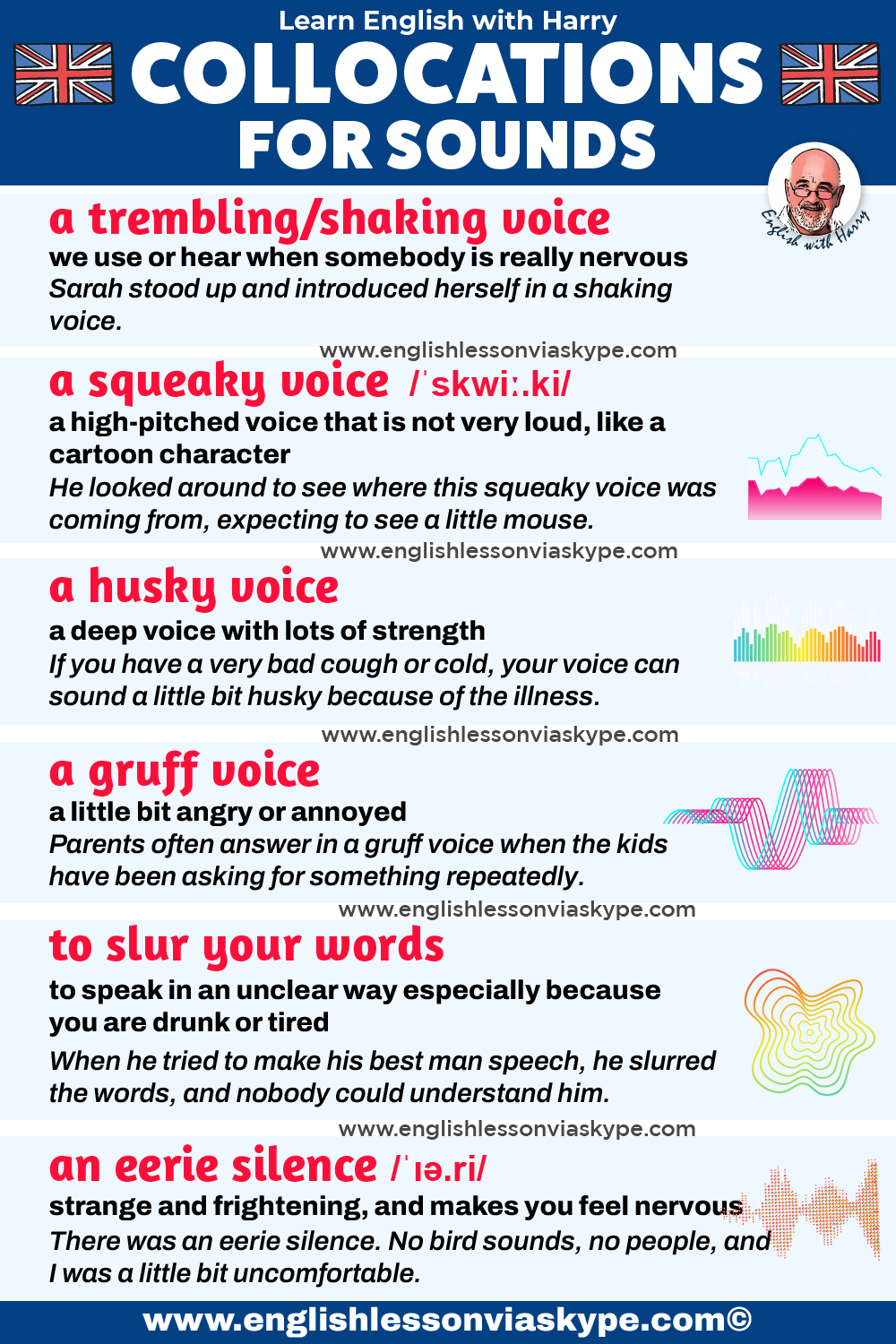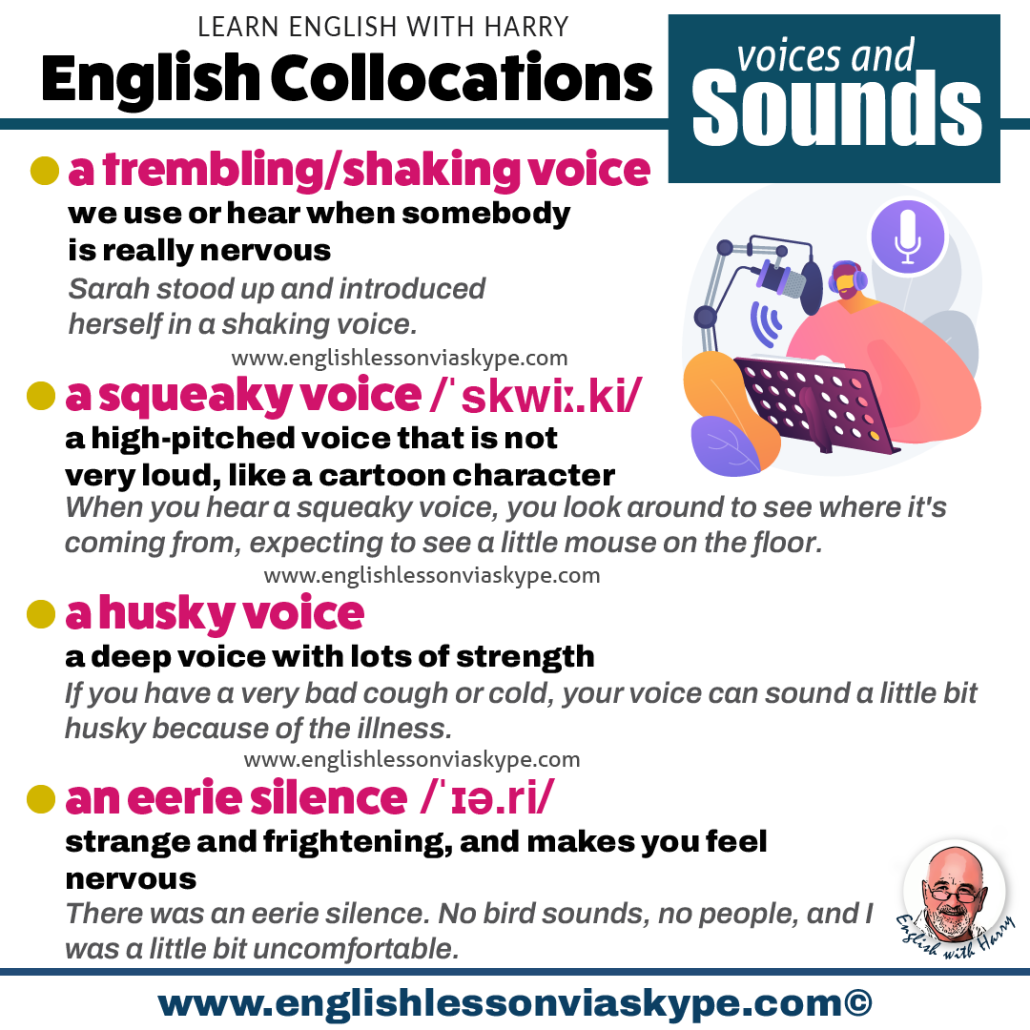List of Collocations
Harry
13 advanced collocations to describe sounds
As always, I’ve got a list of them ready for you.
In fact, I’ve got 13 collocations for sounds and voices.
Some say lucky, some say unlucky. 13. I’ll go through them, and then we go back to them one by one and give you an example so that you can practise it.
Online English Courses from €7.99
a small voice
Meaning: quietly and with some fear and nervousness
A small voice can be somebody who’s battling against lots and lots of people who are talking about one thing. They’re all supporting each other, and you’re the lone small voice that says,
Excuse me, I don’t agree.
❌ I can’t hear you. Your voice is too small. Please speak up.
✅ I’m sorry, I’m having trouble hearing you.
a trembling/shaking voice
Meaning: we use or hear when somebody is really nervous
Example:
Sarah stood up and introduced herself in a shaking voice.
a squeaky voice
Meaning: a high-pitched voice that is not very loud, like a cartoon character
Example:
Often, when you hear a squeaky voice in a restaurant or in a cafe, you look around to see where it’s coming from, expecting to see a little mouse on the floor.
book your trial English Lesson
a husky voice
Meaning: a deep voice with lots of strength
Example:
If you have a very bad cough or cold, your voice can sound a little bit husky because of the illness.
a gruff voice
Meaning: a little bit angry or annoyed
Examples:
Parents often answer in a gruff voice when the kids have been asking for something repeatedly.
He remained silent for several minutes, and then he spoke in a gruff voice.
muffled voices
Meaning: you can’t clearly distinguish what they are saying
Example:
People are always coming in and out of the main entrance, and I often hear muffled voices.
13 advanced collocations to describe sounds

Share and help other students to improve English language skills.
to utter a word
Meaning: say something (often used in the negative)
Examples:
Don’t utter a word. I want you to sit there silently, open your books and get on with your work in class.
Don’t utter a word of this to your sister. Don’t tell her what we’ve agreed, it’s a surprise for her birthday.
to slur your words
Meaning: to speak in an unclear way especially because you are drunk or tired
Example:
Joe had a few whiskies to calm his nerves. When he tried to make his best man speech, he slurred the words, and nobody could understand him.
Speak better English with Harry - podcast episode 381
13 advanced collocations to describe sounds
a broad accent
Meaning: strong and very noticeable accent (way of pronouncing the words), showing where the person is coming from
Example:
Even after living in the UK for 50 years, she still spoke with a broad Australian accent.
a trace of an accent
Meaning: indistinct, barely noticeable accent
Example:
It really was a nice recording. There was a trace of an accent, but it’s very hard to understand exactly where it was from.
a stony silence
Meaning: nobody speaks, nobody makes any noise
Example:
When he looked around the room, there was a stony silence. Nobody commented. Nobody asked any questions. They all looked at the floor.
13 advanced collocations to describe sounds

an eerie silence
Meaning: mysterious and frightening
Example:
There was an eerie silence. No bird sounds, no people, and I was a little bit uncomfortable.
Let me give these 13 advanced collocations to describe sounds to you one more time.
- a small voice
- a trembling/shaking voice
- a squeaky voice
- a husky voice
- gruff voice
- muffed voices
- utter a word
- slur your words
- broad accent
- trace of an accent
- peals/hoots/gales of laughter
- stony silence
- an eerie silence
Okay, so as I said, they’re all collocations connected with sounds.
So try them, see how you can use them, and make sure you can understand them.
If you want to contact me do so on www.englishlessonviaskype.com
Always happy to get your comments and to help you where we can help you.
If you or your family are looking for online English lessons, please go ahead and book a free trial.
Thanks for listening. Join me again soon.
More information
For more information on English grammar rules, English collocations and English idioms, check out the links below:
How to use Stative Verbs in English
You can always study English advanced level at Learning English with the BBC and British Council Learn English.
You will love these English lessons

English Idioms Related To Technology
Learn idioms related to technology. Here I have 10 interesting English idioms that are connected with technology. Nuts and bolts.


Difference between Older and Elder
I explain the difference between older and elder in this short video lesson. As always, with plenty of examples. Scroll


Collocations To Describe Physical Appearance
Learn important collocations to describe physical appearance in a more detailed way. This vocabulary is useful for real-life situations and

